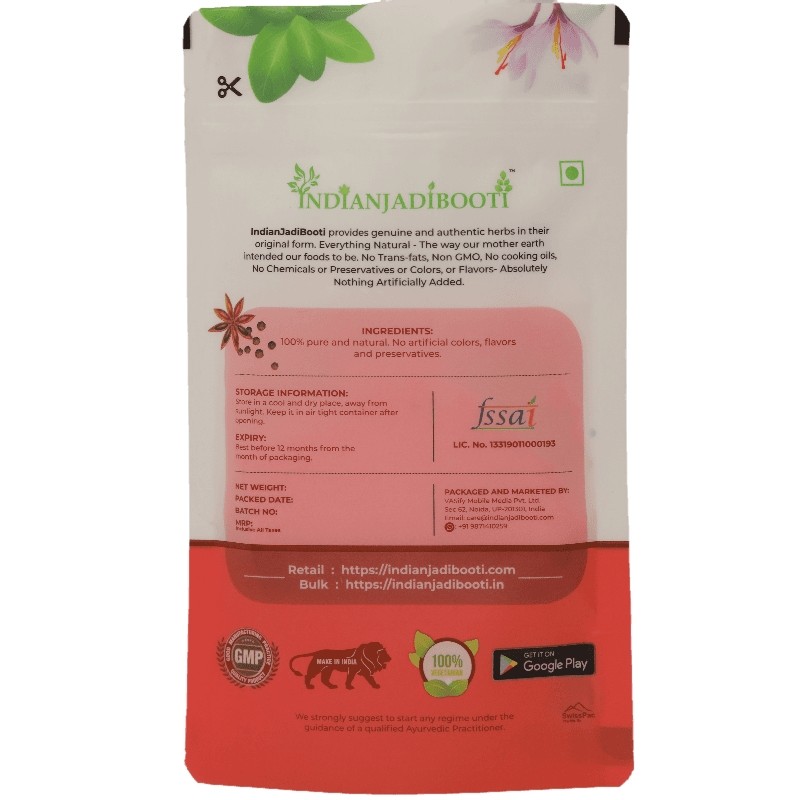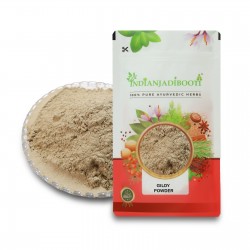











- Stock: In Stock
- SKU: HERB000492
- Shipping: Free within India upto 10KG
- Quality: Premium Herbs with No Adulteration
- Delivery: Within 3 to 7 Working Days in India
- Shipping: From Delhi based Facility
- Transport Charges for 25KG and above: Extra on To Pay
- COD Available: Max Limit: 2 Kg and Rs 3500 per order
- Discount on Prepaid Orders: Rs 50/- off. Auto Apply on Checkout.
Available Options
Description
IndianJadiBooti Sajji Kali is of Premium Quality and is hand selected and sourced directly from farmers and reliable suppliers. We use the best processing and preservation methods to secure the highest quality standards in all our products.
- Original 100% Genuine Quality Guaranted to have Maximum Effectiveness
- NO Preservatives, NO Adulteration, NO Added Color or Fragrance
- Procured directly from Farmers
- Packed in GMP Certified Facility
- Certified Quality
- Clean and Sorted herbs available in Retail as well as Wholesale
- Rich in Nutrients
- Unlock the potentials of these natural treasures provided by our mother earth. These boost your energy and assist your entire wellness journey.
Spending money on quality food is a long-term investment in your health. As the old adage goes, an ounce of prevention is worth a pound of cure.
Black Sajji , Sajji Kali, Sajji Khar Black, Sodium Bi Carbonate, Chot Sajji, Chob Sajji, Sajjikhar, Swarjika Kshara, Sajjika Kshar, Sarjika Kshar, SajjiksharReviews
100% Customers recommend this product
-
5 Awesome100%
-
4 Great0%
-
3 Average0%
-
2 Bad0%
-
1 Poor0%
Reviews Over Sajji Khar (Black) - Chot Sajji - Chob Sajji - Sodium Bi Carbonate - Sajji Kali - Black Sajji - Saji Kaali - Swarjika Kshara - Sajjika Kshar - Sarjika Kshar by IndianJadiBooti
- (5)
Total Reviews (3)
click here write review to add review for this product.
-
(0)
-
(0)
-
(0)
-
(0)
-
(0)
Report this review.
FAQ
Papad khar is a natural stuff used to make papads, which are thin, crunchy Indian snacks. It looks like brown pieces. People break these pieces and mix them with water. They add this water to the dough when making papads. Papad khar helps make papads taste good and feel special when you eat them.
Khar is a special ingredient used in Assamese cooking. People use it to make many dishes, like:
Fish curry
Meat curry
Papaya curry
Different vegetable dishes
Khar is usually part of the main meal in Assam.
Local people believe Khar is good for health too. They think it can:
Clean the stomach
Help with stomach problems
Mullein is a plant with many uses:
It has a slimy substance that helps soothe skin problems like:
Itching
Eczema
Burns
Inflammation
It softens and calms irritated skin
It can also:
Help heal wounds
Shrink hemorrhoids
Papad khar is a special salt used to make papads (thin, crispy flatbreads):
It helps make papads crispy and puffy when fried
It's also used in a dish called khichu
Papad Khar: A Simple Explanation
Papad khar, also called sajji khar, is a special ingredient used to make papads (thin, crispy Indian flatbreads). It helps in two ways:
Makes the dough easier to roll
Improves the quality when frying
Papad khar is a powdery substance that comes from two sources:
Alkaline deposits found in soil
Ash from burning certain plants like Salicornia, Arthrocnemum, Salsola, and Haloxylon recurvum
This ingredient is important in making papads crispy and tasty.
Papad khar is a mix of different salts. Scientists looked at many samples and found:
It has 1.6% to 58.3% carbonates
It may have up to 18.9% bicarbonates
It has 1.2% to 72.0% chlorides
It may have up to 2.6% sulphates
These are all different types of salts. The amounts of each salt can vary a lot between different samples of papad khar.
Salsola stocksii is a type of plant. It's a small shrub that grows in sandy areas. This plant is mostly found in parts of Pakistan and India.
The plant has a special way of dealing with salt in the soil. It can survive in places where there's a lot of salt, which many other plants can't do.
People sometimes use this plant for different things:
As food for animals
To make medicine
To help stop soil from washing away
Scientists are interested in Salsola stocksii because it can live in tough conditions. They think it might help us learn how to grow crops in salty soil.
The plant is named after a person called Stocks, who probably first found or studied it.















